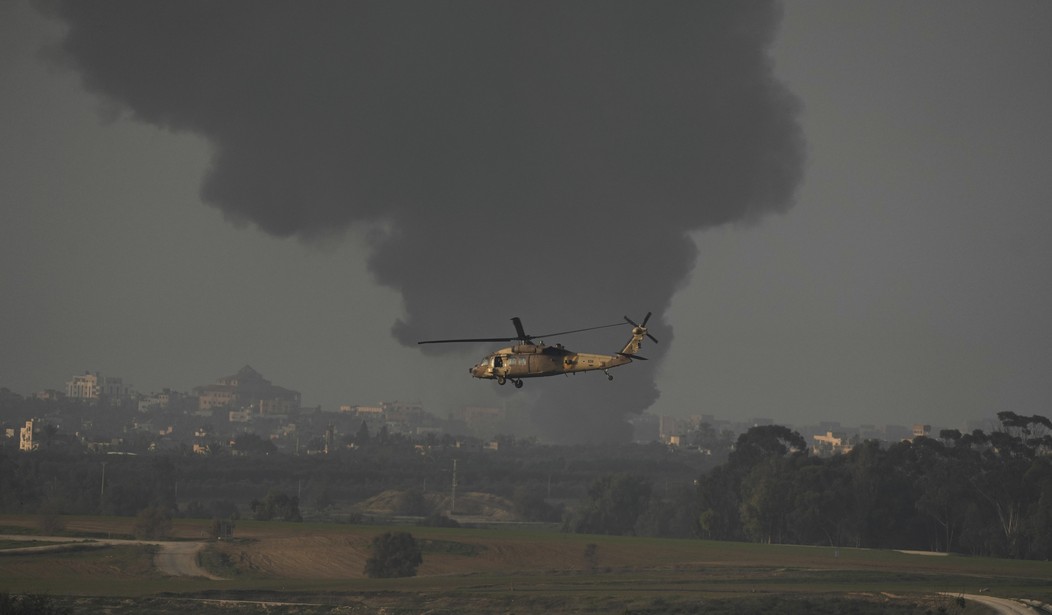In Tehran, it would seem that the saber-rattling is done and the sabers have been drawn. Iran launched as many as 100 drones and missiles against Israel from multiple points of origin across the region. The good news is that Israel, with the help of U.S. forces and resources, destroyed nearly all of them using various countermeasures. Damage to Israeli assets was described as "minimal" and no deaths were reported as of this morning. Iran immediately began issuing threats against both Israel and America, warning against "interference" or any sort of retaliatory strikes. The response from the White House seemed a bit confusing (raise your hand if you're surprised) but the overall tone was positive and supportive of Israel and Bibi Netanyahu.
The Pentagon said U.S. forces intercepted “dozens of missiles” and drones launched from Iran, Iraq, Syria and Yemen that were headed toward Israel.
With regional tensions at their highest since the Israel-Hamas war began six months ago, Biden pledged on Saturday that American support for Israel’s defense against attacks by Iran and its proxies is “ironclad.” The attack marked the first time Iran has launched a direct military assault on Israel, risking a wider regional conflict...
The U.S. and Israel had been bracing for an attack for days after Iran said it would retaliate for a suspected Israeli strike this month on an Iranian consular building in Syria that killed 12 people, including two senior Iranian generals in the Revolutionary Guard’s elite Quds Force.
The actions taken by United States military assets in the region stood at least partly in contrast to the words coming from the White House. Unfortunately, words matter in tense times such as these. Both Joe Biden and Jake Sullivan declared that American support for Israel remains "ironclad." (That seemed to be the buzzword of the day yesterday evening.) To his credit, Biden shortened his trip to the beach and returned to Washington to meet with his military advisers. We also should not ignore the devastating effectiveness of the combined Israeli and American response. Iran's attack was almost entirely thwarted, so we will send a message of "job well done" to all concerned.
At the same time, however, everyone seems to be holding their breath to see what comes next. Iran isn't apologizing or signaling any sort of intent to back off following the largely failed attack. Israel is clearly aware that this could escalate further. Iran has effectively declared war on Israel by firing on its home territory, though no official declarations of war have been issued. Then again, the United States has been fighting for decades without an official declaration of war from Congress, so we really can't be pointing fingers. Still, Biden later made it clear during a call with Netanyahu that the United States "will not be participating in any offensive against Iran." He also said that "nothing of value" was hit in Israel. (NY Post)
President Biden told Israeli Prime Minister that nothing of “value” was hit in Iran’s airborne attack Saturday and asserted American forces will not be participating in any offensive against Iran, according to a report.
The president called Israel’s defense during the attacks a win — telling Netanyahu Israel’s ability to intercept nearly all of the hundreds of missiles and drones showed its military superiority, a US official told CNN.
Biden also made it very clear that the US would not be engaging in any military offensive against the Islamic Republic, the senior official told the channel.
All of these statements appear to depend heavily on your definition of "participating." At least some of the defensive counterstrikes that took out Iran's drones and missiles were fired by U.S. forces. The lion's share of the gear that Israel was using came from America. In that light, it's easy to say that America is already "participating" in a fairly serious fashion. Of course, the White House may be referring more to the idea that U.S. troops won't be directly involved in attacking Iran or any of its proxies. But we've already dipped a toe over that line a number of times by attacking IRGC forces in Iraq and Syria.
I tend to agree with General Spider Marks, who was on several networks offering analysis this morning. He's saying that both the United States and Israel need to "stop talking about next steps" and telegraphing our punches, or lack thereof. Neither the United States nor Israel appear inclined to launch a direct assault against Iran at the moment, which is fine for the time being. But we shouldn't be taking the option off the table. We want Iran to be worried about the consequences of their actions, perhaps inspiring them to show some restraint. The Iranians only respect force, so we need to at least allow them to believe that we're ready to deploy that force if pressed too far. Either way, we seem to have reached the next level of the game. This will require very careful handling by the White House. We can only pray that Joe Biden has someone competent keeping a hand on the wheel. Recent events do not inspire confidence in that situation, sadly.








Join the conversation as a VIP Member